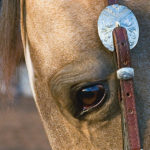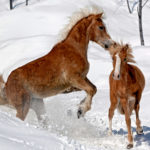Fishtrap Recreation Area, Spokane, Washington
Closest city: Spokane, Washington.
Distance: 30 miles.
Driving directions: From Spokane, follow Interstate 90 to Sprague Highway Rd. East in Lincoln County. Take Exit 254. Follow Sprague Highway Rd. East/Fishtrap Rd. to West Scroggie Rd. Continue onto West Scroggie Rd. The Fishtrap Recreation Area will be on your left.
Terrain: The Fishtrap Recreation Area ranges from steep and mountainous to relatively level. Trails are surrounded by pine forest, grasslands, cliffs, coulees, ponds, lakes, and meadows.
 Credit: Kent & Charlene Krone The Fishtrap Recreation Area ranges from steep and mountainous to relatively level. Trails are surrounded by pine forest, grasslands, cliffs, coulees, ponds, lakes, and meadows.
Credit: Kent & Charlene Krone The Fishtrap Recreation Area ranges from steep and mountainous to relatively level. Trails are surrounded by pine forest, grasslands, cliffs, coulees, ponds, lakes, and meadows.History: The area of Washington now home to the Fishtrap Recreation Area once experienced nearly 300 catastrophic volcanic eruptions, beginning 17 million years ago. Layers of lava created more than 60,000 miles of hardened surface that defines the region with a unique landscape.
Managed by the Bureau of Land Management, the Fishtrap Recreation Area now covers more than 7,000 acres of public land.
Top trail tips: From the Folsom Farm area, you’ll find trails that traverse wetlands and meadows. On your ride, you’ll be serenaded by songbirds as you view of nesting waterfowl, raptors, deer, amphibians, and other wildlife. The upper loop takes you past Hog Lake and the waterfalls. The lower loop encompasses a large portion of Fishtrap Lake.
Amenities: You’ll find excellent trailer parking south of the Ranch House. There’s a primitive camp at Folsom Farm, which offers a fire ring and an outhouse.
Map: For a map of the area, go tohttp://tinyurl.com/nrecy2n
Custer State Park, East Custer, South Dakota
Closest city: Rapid City, South Dakota.
Distance: 35 miles.
Driving directions: Take Highway 79 south to Highway 36 west. Highway 36 becomes Highway16A, which leads to Custer State Park.
 Credit: Photos courtesy of Custer State Park. Located in the Black Hills, Custer State Park encompasses 73,000 acres of rolling hills, rangeland, granite pillars, creeks, and evergreen forest. A herd of 1,300 bison ranges freely throughout the park.
Credit: Photos courtesy of Custer State Park. Located in the Black Hills, Custer State Park encompasses 73,000 acres of rolling hills, rangeland, granite pillars, creeks, and evergreen forest. A herd of 1,300 bison ranges freely throughout the park.Terrain: Located in the Black Hills, Custer State Park encompasses 73,000 acres of rolling hills, rangeland, creeks, granite pillars, and evergreen forests.
History: Custer State Park, established in 1912, is South Dakota’s first state park. It’s named after Lieutenant Colonel George Armstrong Custer of the Battle of Little Big Horn fame. Gold was discovered in the Black Hills during Custer’s 1874 expedition to the French Creek, which runs through the park. In the 1930s, the Civilian Conservation Corps built roads, campgrounds, and dams throughout the park.
Top trail tips: The park has four marked horse trails; all are accessible from the French Creek Horse Camp. The French Creek and Mount Coolidge ride is nine hours roundtrip. The Big Tree Robber’s Roost Draw and Parker Canyon rides are four hours roundtrip each. The Racetrack Butte/Buffalo Corrals ride is five hours roundtrip.
A herd of 1,300 bison ranges freely throughout the park, sharing the land with wild burros and a host of other wildlife, including pronghorn antelope, mountain goats, and wild turkeys.
A negative Coggins test (for equine infectious anemia) is required of all horses entering the park. Certified weed-free hay or a complete horse feed is required.
Amenities: Located on the banks of French Creek, French Creek Horse Camp is designed specifically for campers with horses. Each site has one corral. Approximately 30 sites are available.
Map: For a map of the area, go to http://tinyurl.com/kc6qkn7.
Shenandoah National Park, Luray, Virginia
Closest city: Richmond, Virginia.
Distance: 93 miles.
Driving directions: Shenandoah stretches more than 100 miles and features four entrances. For the South Entrance, travel west on Interstate 64 to exit 99 (87 miles), and follow the signs to Shenandoah National Park and Skyline Dr. For the Swift Run Gap Entrance, travel west on Interstate 64 to Charlottesville. Take the exit to U.S. Highway 29 North. Turn left onto U.S. Highway 33 West, and follow it 14 miles to Shenandoah National Park and Skyline Dr.
Note: Global positioning systems and online mapping services can be unreliable along this route, so keep a printed map handy.
Terrain: Comprising 200,000 acres of protected land in the Blue Ridge Mountains, Shenandoah National Park features waterfalls, high vistas, and wooded hollows. The park rises above the Virginia Piedmont to the east and the Shenandoah Valley to the west. Two peaks, Stony Man and Hawksbill, exceed 4,000 feet elevation. You’ll ride through a mix of habitats created by the area’s elevation range, latitude, slopes, rocks, soils, and precipitation.
 Credit: Shenandoah National Park Shenandoah National Park features waterfalls, high vistas, and wooded hollows. The park rises above the Virginia Piedmont to the east and the Shenandoah Valley to the west.
Credit: Shenandoah National Park Shenandoah National Park features waterfalls, high vistas, and wooded hollows. The park rises above the Virginia Piedmont to the east and the Shenandoah Valley to the west.History: The area was once farmland. Remnants of old farms still remain throughout the park. To acquire the parkland, the state of Virginia used eminent domain, requiring entire communities to vacate portions of the Blue Ridge Mountains. Most of these residents were farmers with apple orchards in the Shenandoah Valley. Many families left without a fight after the drought of 1930, which destroyed their crops. The park was established in 1935.
Top trail tips: The park offers more than 20 riding trails ranging from 9 to 35 miles long. Trails designated for horse use are marked with yellow paint blazes on trees.
Amenities: Horse camping is discouraged in the park, but overnight-boarding facilities are available at private facilities nearby. You can camp with your horse on adjacent state lands.
Map: For a map of the area, go to http://tinyurl.com/ldc3jht.






